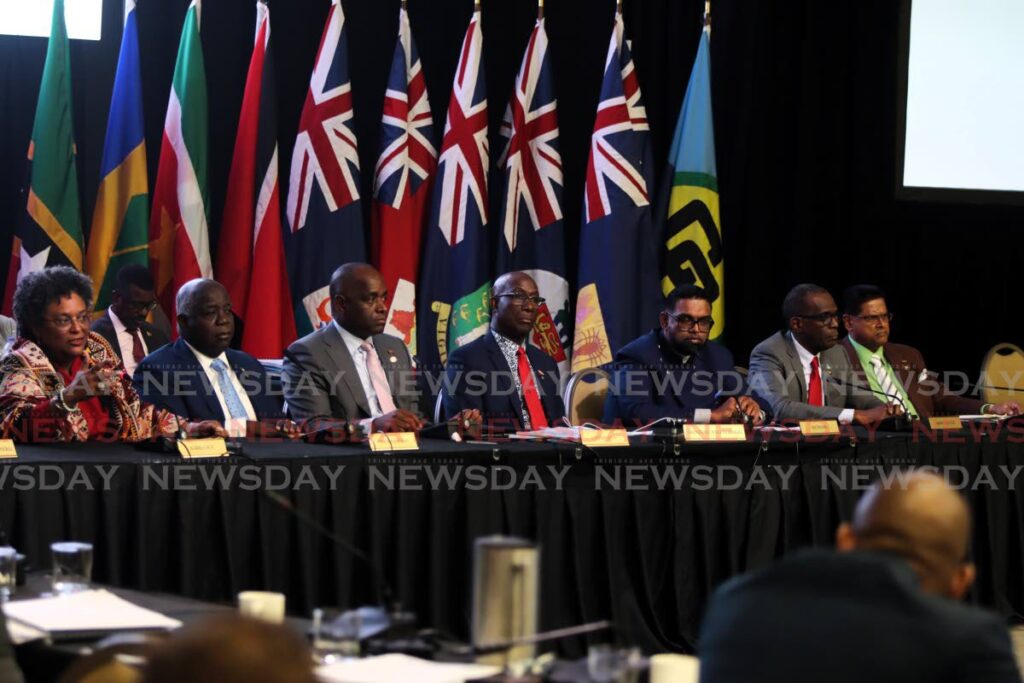Caricom leaders agree to CSME expansion

CITIZENS of most member states of the Caribbean Community (Caricom) will soon enjoy full freedom of movement throughout this region bloc, Caricom chairman Roosevelt Skerrit said on Wednesday. He was addressing the closing news briefing of the three-day 45th Regular Conference of Caricom Heads at the Hyatt Regency, Port of Spain.
Skerrit said this new agreement would exclude the Bahamas, which was not a member of Caricom’s Caribbean Single Market and Economy (CSME), and Montserrat, a British dependency whose population had been largely evacuated after a volcano in 1995.
Barbados Prime Minister Mia Mottley later said Haiti had requested not to be included in the free movement deal owing to its domestic situation, which has been characterised by economic, political and social instability, amidst devastation by repeated natural disasters plus the recent rise of powerful criminal gangs.
At present, Caricom allows the free movement of certain categories of skilled worker such as journalists and musicians on registration.
Skerrit, Dominican Prime Minister, said based on prior consultations, Caricom heads had agreed now to “connect the dots” through the region.
“On the issue of free movement, we have deliberated on this matter. We took a decision to have the free movement of all categories of people to live and work.”
He said some legal issues had to be examined with legal advisers to report back to Caricom leaders by March 30, 2024.
“In addition to free movement there are certain contingent rights which will be associated with free movement – access to primary healthcare and emergency healthcare, access to basic education – free primary and secondary education.” He said Caricom’s existing security provisions would also apply to the free movement deal.
Skerrit said free movement was core to Caricom’s integration movement.
“We will have served and have served the community well at this meeting by arriving at that decision. We hope it can be implemented by March 30, 2024.”
“This is great news,” he said, earning applause. “Of all the issues we have discussed and a number of decisions we have taken, this is the decision we have taken at this conference.”
He reckoned Caricom’s founders were now smiling from heaven at this decision.
Skerrit invited Caricom leaders to meet in Dominica on August 30 in a relaxed setting of T-shirts, jeans and maybe shorts.
A reporter asked for details of the proposed free movement.
Mottley said, “The heads agreed we are now moving beyond the freedom of movement of skills to freedom of movement of people.”
She said out of an abundance of caution some aspects of the the Revised Treaty of Chaguaramas may need to be amended between now and next March.
“There may have to be an approach that does not make countries liable to any form of (law)suit with respect to some of the rights. So there has to be a minimum set of rights guaranteed for the citizens. That will be discussed and agreed upon. That will be captured in the amendments to the treaty.”
Mottley said the changes will have to be financed, for which leaders were looking at the Caricom Development Fund. Funding would help to guarantee that each country could bring its services up to a minimum level towards free movement.
She said the Revised Treaty of Chaguaramas had certain precepts that could make countries liable unless now specfically excluded.
“During the pandemic, we had to carve out certain things. There were restrictions on movement for public health purposes - that was understood.
“The treaty provides for restrictions for national security purposes. The treaty provides for restrictions for balance of payments purposes.”
She said under the free movement initiative an award of primary and emergency healthcare rights and education rights would be added to social security rights already agreed among Caricom nations.
“So what we are doing is to ensure the desire of Heads is met by the reality of implementation.”
Mottley agreed Caricom founders would be smiling. “In a very real sense this is what ordinary people want.
“I want to say something. In a region that is underpopulated and in a region facing the most difficult crises - from climate to recovery from pandemic to debt to to all kinds of other problems, if ever there was a time we all need to come together it is now.”
She said Skerrit was right to speak of optimism even as a realistic execution would ground Caricom.
Newsday later asked Mottley if countries’ populations should fear criminals arriving from other countries within Caricom.
Mottley: “No, because you have the ability to take decisions in the interest of national security.
“Countries have the right to exclude persons on the basis of national security or public health.”


Comments
"Caricom leaders agree to CSME expansion"